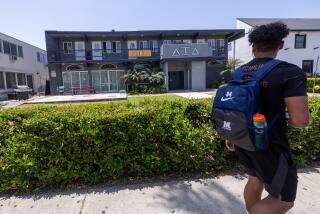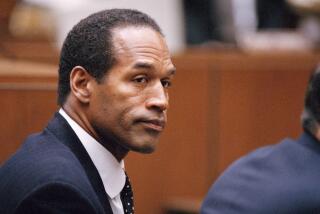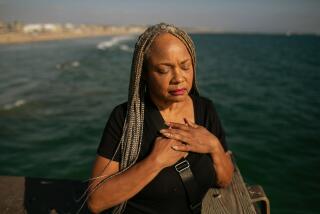Victim Held Animosity Only Against Prejudice : Profile: Friends say Vernon Flournoy was willing to fight over racial insults. It may have cost O.C. black his life.
- Share via
HUNTINGTON BEACH — Vernon Flournoy’s parents brought their 10 children up to believe that people were just people. There was no such thing as race. Color didn’t matter.
Growing up in East Los Angeles and later living in Seattle, there was only one thing the quiet, serious Flournoy couldn’t abide: “rude remarks, especially racial things,” said his sister, 53-year-old Betty Lewis.
“He always said that our parents taught us when we were growing up that everyone is the same,” Lewis recalled from her Ridgecrest, Calif., home. “Then you grow up and you find out that it isn’t that way. I think he always had a hard time dealing with that.”
If someone on the street gave him trouble because he was black, a dozen friends and relatives unanimously agreed Tuesday, Flournoy wouldn’t have backed down.
“He said if someone does something racial directed at him, ‘I will fight it. I will fight that person. I will become instantly angry,’ ” said Raymond Johnson of Westminster, a co-worker of Flournoy’s at Matson Navigation, a shipping company on Terminal Island.
This portrait of Flournoy emerges as police continue to investigate whether a racial epithet triggered the scuffle that cost the 44-year-old African American man his life last week. Police contend that Jonathan Russell Kennedy, a 19-year-old white man with a shaved head and tattoos, shot Flournoy after a brief sidewalk altercation along Beach Boulevard in Huntington Beach.
Kennedy has also been charged with the attempted murder of two Latino men in an assault the month before. Police say he has been seen with individuals associated with white supremacist organizations and are investigating whether the Flournoy slaying was a hate crime.
But in an interview Tuesday, Kennedy’s mother denied that her son was a racist or a white supremacist.
Police said that at the time of the killing, Kennedy was staying briefly at the Seabridge Villas, the same gated Huntington Beach apartment complex where Flournoy lived with his wife.
Tuesday, Sharon Flournoy, a real estate broker, said she had never seen Kennedy around the complex and knew nothing about him. After spending the day making funeral arrangements for her husband of just two years, Sharon Flournoy did not want to discuss whether his slaying was a hate crime, saying simply that Tuesday was “a bad time, a bad time for me.”
But Frank Honorato of Fountain Valley, Flournoy’s close friend and car-pool partner, said racial conflict was the one topic that enraged Flournoy, a refrigeration mechanic, during their drives to and from Terminal Island in Los Angeles Harbor.
“He’s real defensive about it,” said Honorato, who drove home with Flournoy the night of his death. “He told me one day when we were going home there isn’t such a thing as race. We’re all the same thing.”
Honorato said he and Flournoy had recently talked of going on a fishing trip. On the drive home the night he died, Flournoy spoke with optimism that the rocky early going of his new marriage was finally over. His wife was establishing a real estate business. He spoke of buying a house and settling in.
“He was happy,” Honorato said. “Today I kept thinking he was going to come up to me in the shop at 5 p.m. and say, ‘C’mon, let’s go home.’ That’ll never happen again.”
Flournoy’s siblings said he and his new wife had moved to Huntington Beach from Seattle as newlyweds in 1992 to be closer to their children from earlier marriages.
For Vernon Flournoy, the move was something of a homecoming.
Flournoy’s parents--”looking for the good life”-- had moved their six girls and four boys from DeWitt, Ark., to the Aliso Village section of East Los Angeles when Flournoy was 12.
As a youngster, the shy, well-behaved Flournoy dreamed of basketball stardom. As a senior at Theodore Roosevelt High School, he was a standout, recalled his sister Barbara Blanche, 59, who helped raise him.
But he left junior college after a year, when marriage to a neighborhood sweetheart and three children--two girls and a boy--landed him in the working world. He and an elder brother, Bruce, now 47, went to welding school and Flournoy found work in the Pomona area.
In 1974, a drunk driver scattered the tightknit family. Flournoy’s mother, who didn’t drive, was killed crossing the street when the drunk driver rear-ended another car, sending it plowing into her. Flournoy’s father, who was ill with cancer, died a short time later.
“I don’t think he ever got over it,” said elder sister Betty Lewis. “It affected us all.”
Flournoy, who divorced his first wife in the early 1970s, moved north with his brother to a job in Seattle. For the next 18 years, he worked as a shipping container repairman and welder, said Bruce Flournoy, who still lives in Seattle.
In 1992, Flournoy, who had told family members he thought he would never remarry, fell in love again. The newlyweds moved to Huntington Beach, where his wife’s daughter, a new job and warm weather awaited.
Last January, Flournoy’s life changed again, when a heart attack struck him on Super Bowl weekend, followed by an angioplasty to clear clogged arteries.
After that, co-workers said, Flournoy no longer let things bother him. He bugged his brother to eat better, bought friends fruit bars and took long strolls through the neighborhood. And when he was offered doughnuts, he’d point to his heart and say, “No, thank you.”
While his co-workers fought at weekly grievance meetings, Flournoy would sit in a chair off to the side with a slight smile on his face.
“It was like he had a secret,” Johnson said. “He knew that our petty grievances are nothing. He was just glad to be alive.”
He’d invite another co-worker, Bobby Perkins of Carson, out to “oldies” shows, jazz concerts or food fairs. Or he’d head out to play blackjack in Laughlin, Nev., or Las Vegas.
But Johnson said about four or five months ago, Flournoy was partnered with another mechanic whom Flournoy believed disparaged him and other black workers. In one incident, Flournoy told Johnson he saw the other mechanic bark at a black truck driver, then politely help a white truck driver.
“He said the other mechanic talked down to him and ordered him around,” Johnson said. “He said (the racial slights) were the only thing he hadn’t been able to let go of since his heart attack.”
Flournoy’s siblings said their proud brother may have found himself in a situation where his beliefs were put to a test.
“I don’t think he’d start anything,” said his brother-in-law, Jeff Blanche of Ridgecrest. “But if someone said something he’d probably advise him that he was uncomfortable with that sort of thing.”
“I do know his opinions, that he did believe in fairness in his job and in his life,” said Bruce Flournoy. “Would he have stood up for himself? Well, yes he would.”
* MOTHER IN DEFENSE: Suspected hate killer is not racist, his mother insists. A19
More to Read
Sign up for Essential California
The most important California stories and recommendations in your inbox every morning.
You may occasionally receive promotional content from the Los Angeles Times.










